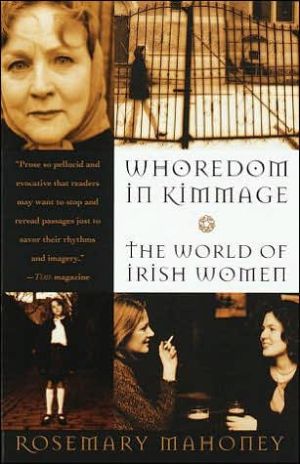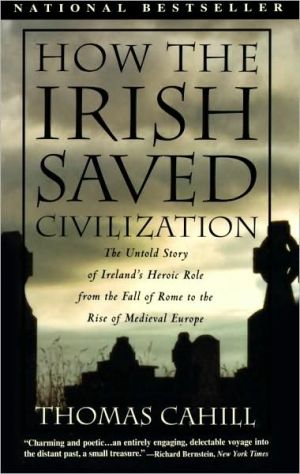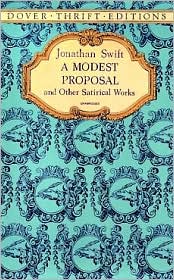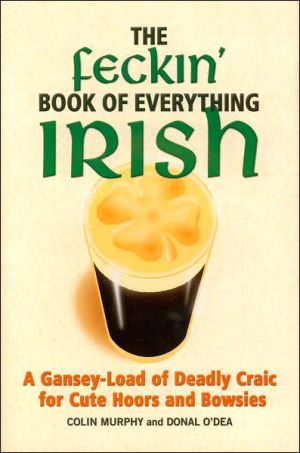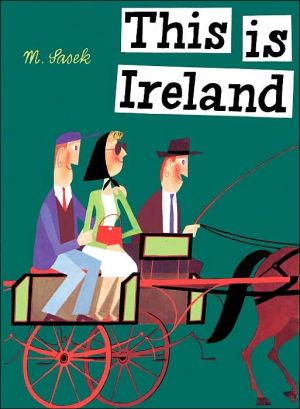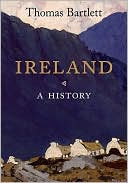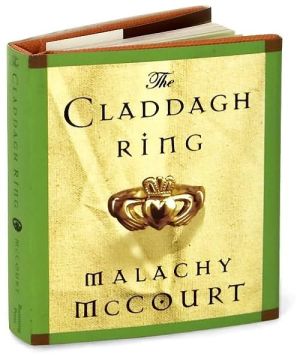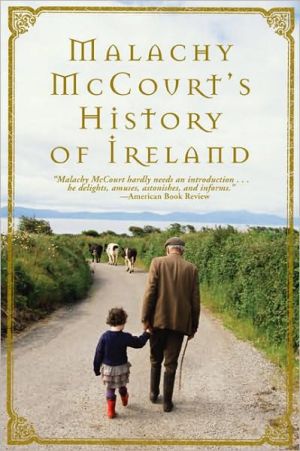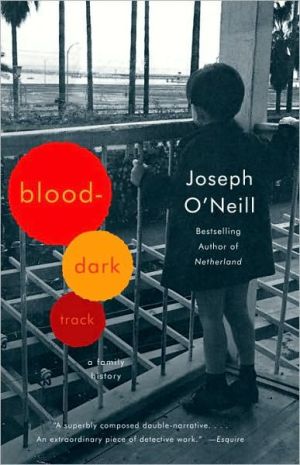Whoredom in Kimmage: Irish Women Coming of Age
Written with the art of a skilled fiction writer whose ear for Irish bluster is pitch-perfect, Whoredom in Kimmage tells the tale of contemporary Irish women through a series of brilliantly animated scences that take the reader from Dillon's tiny pub in rural Corofin to the heart of Dublin. This beguiling account of Irish life transcends that nation's small shores through the power of Mahoney's great storytelling gifts.\ Before the phenomena of Frank McCourt's Angela's Ashes, and Thomas...
Search in google:
Written with the art of a skilled fiction writer whose ear for Irish bluster is pitch-perfect, Whoredom in Kimmage tells the tale of contemporary Irish women through a series of brilliantly animated scences that take the reader from Dillon's tiny pub in rural Corofin to the heart of Dublin. This beguiling account of Irish life transcends that nation's small shores through the power of Mahoney's great storytelling gifts.Before the phenomena of Frank McCourt's Angela's Ashes, and Thomas Cahill's How the Irish Saved Civilization, Rosemary Mahoney traveled to Ireland in response to the growing feeling that changes were taking place, and that those changes directly involved women. Her ideas are animated in brilliantly crafted scenes, taking the reader from Dillon's tiny pub in Corofin to a lesbian pub in Dublin, from a Legion of Mary meeting to a classroom full of boisterous schoolgirls determined to drive their teacher, S'ta Keatin', over the edge. Here, too, are scenes with Ireland's first woman president, Mary Robinson, and the country's preeminent woman poet, Eavan Boland. But most memorable, and perhaps most prescient of the recent enchantment with literature about the Emerald Isle, are Mahoney's pitch-perfect ear for Irish bluster and warmth, her eye for detail, and people so real and unforgettable you'd think they were having a cup of tea with you. Publishers Weekly ``There's only one sin in Ireland. Sex.'' So says Jean O'Brien, one of the progressive Irish women portrayed in this marvelously insightful, funny, disturbing, yet ultimately hopeful book. Mahoney ( The Early Arrival of Dreams ) looks at Irish women and their efforts to bring Ireland--in terms of personal choice and freedom--into the late 20th century. The author, who is an American of Irish descent, dissects the Irish--men and women alike--through their words and actions. Unremarkably, most of the book's focus is spent in pubs in Dublin and Corofin, County Clare. We listen to Francis, the wise publican at Dillon's pub: `` . . . if the Dutch were in Ireland, they'd own half of Europe, and if the Irish were in Holland, they'd drown,'' and we encounter the extraordinary women of J. J. Smythe's lesbian bar in Dublin on their Saturday night adventures. Outside the pub, we meet with a diverse group of characters: Ruth Riddick, the activist most responsible for bringing information about birth control to Ireland; the conservative and saturnine members of the Legion of Mary; Eavan Boland, who tells us about the problems of being an Irish woman poet; and Mary Robinson, who with her election as president, has turned what in essence used to be a patronage job for aged political hacks into an office of respect, prestige and voice. The author portrays the sexual tension (much of it fueled by alcohol) that permeates the society. We also see the fruits of that sexual tension--a notably high illegitimacy rate and its social and political fallout. Mahoney, who has a wonderful ear for the expletive-filled Irish use of English, has the ability to chill the bones and make one feel loneliness as a theme of Irish life. Ultimately, this struggle for Irish sexual freedom may yet be fought in the streets of Dublin, like the political revolution of 1916. For as President Robinson says, ``In a society where the rights and potential of women are constrained, no man can be truly free. He may have power, but he will not have freedom.'' First serial to Mirabella; BOMC alternate and QPB selection; author tour. (Aug.)
Preface\ WHEN I WAS SEVENTEEN I spent the summer on Martha's Vineyard working as domestic factotum to the playwright Lillian Hellman. I was as ornery at seventeen as Lillian Hellman was at seventy-three. We argued our way through that summer, argued about everything from the rules of the road to the temperature of the day to herbs and vegetables. ("You obviously didn't grow up in the country, Rosemary." "How is that obvious, Miss Hellman?" "You don't seem to be able to recognize vegetables." "What haven't I recognized?" "Mint, for one." "I grew up in the country. Mint isn't a vegetable.") Once, when I returned from the market with the wrong jar of pickles, Lillian sucked on her cigarette, boosted her formidable nose into the air, and said, "You're smart, Rosemary, but you should learn to write things down."\ I was writing things down. Every night when released from the scullery, I went to my room and wrote things down. I was unhappy and exhausted, and I charted my woes with a pencil and pad. She's stingy. She buys Jim's vodka, the cheapest there is, and makes me funnel it into a Smirnoff bottle to trick her guests.\ And then one evening I overheard Lillian saying to her friend William Styron, "I see the little Irish girl has set out the wrong dinner plates again."\ The remark--which amounted to an epithet--conjured images of a feckless, carrot-topped rustic with a camel's long lashes and a blush that traveled from throat to freckled hairline, awash in a sea of plates the likes of which she had never had the privilege to be confused by before. And in spite of Lillian's ire, the remark delighted me. At fifteen I had, by dint of my Irish grandparents, requested and acquired Irish citizenship. Though I was born in Boston and grew up there, Irish was always the way I thought of myself and the way I wanted others to think of me. I was an Irish girl--Lillian Hellman got that right.\ MY GREAT-AUNT Elizabeth Fraher had a long, expressive face, was tall, never married, and wore black dresses and a wide-brimmed hat. Like her sister, my grandmother, who died when I was an infant, Lizzie had come to Boston from Ireland in her early thirties. She was a bewitching storyteller who could walk into a room and, without undue effort, win the attention of every person in it. Though my six older siblings and I vied for Lizzie's attention, she managed to make each of us feel like the only child in the world. She would slip you something forbidden and desirable--a dime, say, or a piece of chocolate--while the others weren't looking, and suborn you in a whisper of exaggerated severity to "tell no one about this." She was the most exciting person we knew. But, though she was famous for her warmth and her sense of humor, I have yet to see, among hundreds of photographs of her, a single one in which she is smiling. In every photograph she looks slightly pained. As a child I was not aware of this. I knew only that Lizzie was to be trusted as my own mother was trusted.\ Lizzie's house was the safest place on earth. It was filled with Irish information: two Irish flags crossed above a mirror in her hallway, an Irish doll named Pegeen lying in a wooden cradle, holy water in a dish by the door, an alleged piece of the true cross in a pyx, a portrait of Pope John XXII, a German shepherd named Bran after Finn MacCool's Irish wolfhound, rounds of soda bread with crosses slashed into their faces, and a damask tablecloth that had a shamrock pattern woven subtly into it--you could see the shamrocks only when the light struck the cloth from the right angle. The first thing you saw when you walked through the door was a series of framed portraits of the Irish revolutionaries--Joseph Mary Plunkett, Eamonn Ceannt, Thomas MacDonagh, Sean MacBride, James Connolly, and Padraig Pearse--and a framed copy of Poblacht na hEireann, the Irish Republican Proclamation of 1916. Lizzie and my grandmother were staunch republicans and friends of the revolutionaries. Lizzie had harbored various escaped Irish revolutionaries in her home, among them Liam Mellows, the editor of the Proclamation, who was later executed in Dublin. It was Mellows who had planted the hedges in front of Lizzie's house.\ Lizzie told us about Ballylanders, the Limerick village she and her ten siblings had left behind. We heard how Lizzie skipped school and caught trout in a stream with her bare hands and how she shaped a hideout for herself in a thick hedge. We heard about her donkey, the priest, the Galty Mountains, Limerick City, the Golden Vale, Miss Condon the schoolteacher, and the village idiot. We heard about fairies and banshees and triple rainbows. We heard ghost stories told in speech scattered with modified Irish words and phrases. (If a child cried wildly, she cried "gafook" [ag fuachas], a too-generous person was "flahool" [flaithiuil], and when you got a shock, you got a "croost" [crusta]. There were always parties in progress at Lizzie's house, with a lot of Irish people singing sad Irish songs. If you stayed long enough, you began to think you could hear a donkey's little hooves clip-cropping up Nahant Avenue.\ Because I loved Lizzie, I loved Ireland. It was a place I was deeply aware of but knew nothing about, something I possessed but couldn't grasp. In our own house we had a shelf of Irish books that had belonged to my grandfather. Some were written in Irish, a strange script like Cyrillic. I stared at the books until I understood them; that I couldn't read them was irrelevant.\ ONE NIGHT IN 1968, I sat with Lizzie in her house watching a TV movie about the Titanic. I was seven years old; Lizzie was eighty-six. On the black-and-white screen the sinking ship tipped at a forty-five-degree angle, and a grand piano careered across the ship's dance floor and crashed against a wall. That was, of course, terribly funny. I guffawed at the screen, and before I knew what was happening Lizzie reached out and slapped the backs of my hands with stunning force. I looked at her, astonished. Lizzie had never hit me before. She had never so much as raised her voice at me. I pressed the backs of my stinging hands to the O of my mouth and cried.\ "'Tis nothing to laugh at," Lizzie said. "People died."\ I didn't know anything about people dying and didn't care; I was ashamed only that I had angered the person I loved. Later, when I asked my mother why Lizzie had slapped me, she told me that Lizzie had planned to sail from Ireland on that ship, but a chance event had delayed her a week. The last people to climb aboard the Titanic at Cobh Harbor were people Lizzie knew.\ I PASSED my miserable seventeenth summer with Lillian Hellman, daydreaming about Ireland. Faced with a dreaded final year at boarding school, I had contrived to spend the school year in Ireland studying Irish Gaelic. I wanted to escape familiar things that had grown alien, to surround myself with alien things that had been familiar for years. I often felt that with Lizzie's death, when I was eight, I had been robbed of what belonged to me. At that time it was fixed in my mind that Ireland was the one place where I would feel comfortable.\ And I was right. When I arrived in Ireland I felt as at home as I had in Lizzie's house, and this had as much to do with the pretty distortions that had trickled down to me on Nahant Avenue as with the reality of the country itself. I listened to Irish people talking, and I understood them; I understood what lay beneath their words, what humor, what rancor, what frustration, vibrance, begrudgery, intelligence, and fear. I felt I was among people I knew. In Irish faces I saw faces I knew and was related to. In a Dublin tearoom one afternoon I saw a woman who looked so much like my mother that I followed her into the street. I studied the Irish language--a particularly strange and difficult one--and it sounded familiar to me. It was an eerie thrill to come across the stray Irish words that Lizzie used to utter and to recognize them. In finding things out about Ireland, I was finding things out about myself.\ I was particularly fascinated by the way Irish women talked to each other. They seemed to have a secret among themselves, to know everything there was to know about each other. They had a habit of whispering, as though everything they said was scandalous and private. And they were contradictory. They colluded, then criticized each other. They helped and hindered each other. They were soft and strong at once. They liked men yet were separate from them. They were subordinate in the society, and yet they had remarkable power and control. They were disrespected but feared, fearful but frightening.\ IN 1991 I returned to Ireland. I wanted to learn more about the women and to write about them. I saw Sinead O'Connor's face on the covers of American magazines and thought to myself, This is unlikely. Mary Robinson had been elected as the first woman president of Ireland, and that seemed twice as unlikely. Something in Ireland that was directly related to women was changing, and I wanted to know what it was. I spent six months in Dublin and four months in the village of Corofin in West Clare, and I talked to the people I met. I met Irish women from all walks of life. I had lunch with the Irish Housewives Association, sunbathed naked with the women on Dublin's Bull Wall, talked with Dublin fortunetellers, nuns, abortion activists, poets, students, lesbians, Jews, street venders, and schoolgirls. I talked with Irish poet Eavan Boland and President Mary Robinson.\ In my conversations and travels I learned that a book about Irish women would also have to be a book about Irish men, for a large part of the tale of Irish women lies in their absences. Women have been virtually absent from politics, the church, business, the courts of justice, and the pubs, the central point of Irish social life. In learning about Irish women I was also learning about Irish men, for the women often seemed to be engaged in a response to men. As separate as men and women are in Ireland, it is difficult to separate them.\ The stories in this book combine to tell the tale of women in contemporary Irish society and, by association, the tale of the society itself. As Mary Robinson said at Trinity College, "In a society where the rights and potential of women are constrained, no man can be truly free. He may have power, but he will not have freedom."\ In Ireland, the rights and potential of women are still constrained, and the men are not truly free, and that's what this book is about.
\ Publishers Weekly - Publisher's Weekly\ ``There's only one sin in Ireland. Sex.'' So says Jean O'Brien, one of the progressive Irish women portrayed in this marvelously insightful, funny, disturbing, yet ultimately hopeful book. Mahoney ( The Early Arrival of Dreams ) looks at Irish women and their efforts to bring Ireland--in terms of personal choice and freedom--into the late 20th century. The author, who is an American of Irish descent, dissects the Irish--men and women alike--through their words and actions. Unremarkably, most of the book's focus is spent in pubs in Dublin and Corofin, County Clare. We listen to Francis, the wise publican at Dillon's pub: `` . . . if the Dutch were in Ireland, they'd own half of Europe, and if the Irish were in Holland, they'd drown,'' and we encounter the extraordinary women of J. J. Smythe's lesbian bar in Dublin on their Saturday night adventures. Outside the pub, we meet with a diverse group of characters: Ruth Riddick, the activist most responsible for bringing information about birth control to Ireland; the conservative and saturnine members of the Legion of Mary; Eavan Boland, who tells us about the problems of being an Irish woman poet; and Mary Robinson, who with her election as president, has turned what in essence used to be a patronage job for aged political hacks into an office of respect, prestige and voice. The author portrays the sexual tension (much of it fueled by alcohol) that permeates the society. We also see the fruits of that sexual tension--a notably high illegitimacy rate and its social and political fallout. Mahoney, who has a wonderful ear for the expletive-filled Irish use of English, has the ability to chill the bones and make one feel loneliness as a theme of Irish life. Ultimately, this struggle for Irish sexual freedom may yet be fought in the streets of Dublin, like the political revolution of 1916. For as President Robinson says, ``In a society where the rights and potential of women are constrained, no man can be truly free. He may have power, but he will not have freedom.'' First serial to Mirabella; BOMC alternate and QPB selection; author tour. (Aug.)\ \ \ \ \ Library JournalIn 1991, Mahoney ( The Early Arrival of Dreams , Fawcett, 1992) returned to Ireland to observe what she believed to be a change in the way Irish women functioned in their society, evinced in part by Mary Robinson's election as president and the challenges being mounted against the country's rigid divorce and abortion laws. Alternating between stories of her time spent in Dublin and in the tiny West Clare town of Corofin, Mahoney contrasts her encounters with urban women, who protest, teach, counsel, and strain to enact change, with the near-suffocation of rural women, trapped within traditional mores, the Church, and their own insecurity. Library collections both in women's studies and contemporary Ireland will benefit from Mahoney's insight and skillful writing. She is instructive and entertaining, with a wonderful ear for the language. The book might be better titled, but Mahoney's observations capture the tensions and complexity of Ireland today.-- Susan Clifford, Hughes Aircraft Co. Lib., Los Angeles\ \
